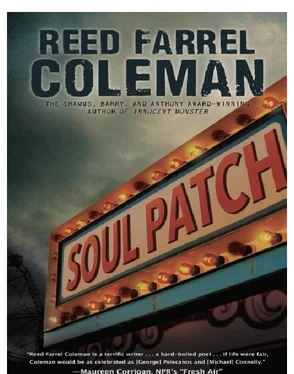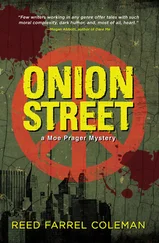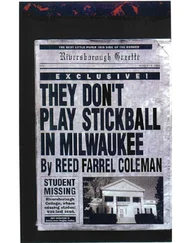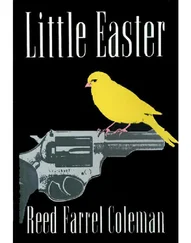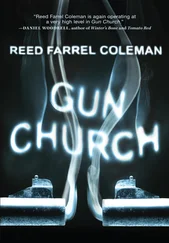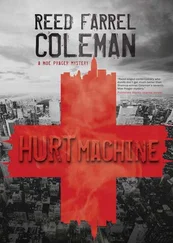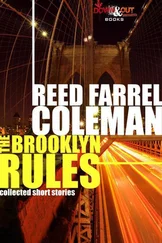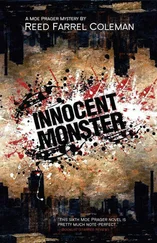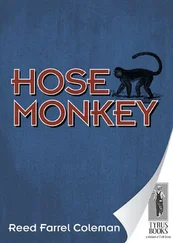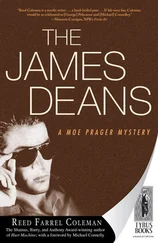Reed Coleman - Soul Patch
Здесь есть возможность читать онлайн «Reed Coleman - Soul Patch» весь текст электронной книги совершенно бесплатно (целиком полную версию без сокращений). В некоторых случаях можно слушать аудио, скачать через торрент в формате fb2 и присутствует краткое содержание. Жанр: Криминальный детектив, на английском языке. Описание произведения, (предисловие) а так же отзывы посетителей доступны на портале библиотеки ЛибКат.
- Название:Soul Patch
- Автор:
- Жанр:
- Год:неизвестен
- ISBN:нет данных
- Рейтинг книги:3 / 5. Голосов: 1
-
Избранное:Добавить в избранное
- Отзывы:
-
Ваша оценка:
- 60
- 1
- 2
- 3
- 4
- 5
Soul Patch: краткое содержание, описание и аннотация
Предлагаем к чтению аннотацию, описание, краткое содержание или предисловие (зависит от того, что написал сам автор книги «Soul Patch»). Если вы не нашли необходимую информацию о книге — напишите в комментариях, мы постараемся отыскать её.
Soul Patch — читать онлайн бесплатно полную книгу (весь текст) целиком
Ниже представлен текст книги, разбитый по страницам. Система сохранения места последней прочитанной страницы, позволяет с удобством читать онлайн бесплатно книгу «Soul Patch», без необходимости каждый раз заново искать на чём Вы остановились. Поставьте закладку, и сможете в любой момент перейти на страницу, на которой закончили чтение.
Интервал:
Закладка:
Reed Farrel Coleman
Soul Patch
PROLOGUE
1972
Nothing is so sad as an empty amusement park. And no amusement park is so sad as Coney Island. Once the world’s playground, it is no longer the world’s anything: not even important enough to be forgotten. Coney Island is the metal basket at the bottom of Brooklyn’s sink. So it is that when the County of Kings is stood on end, Coney Island will trap all the detritus, human and otherwise, before it pours into the Atlantic.
Coney Island’s demise would be easy to blame on the urban planners, especially Robert Moses, who thought it best to warehouse the niggers, spics, and white trash far away from the crown jewel of Manhattan in distant outposts like Rockaway and Coney Island. If they could have built their ugly shoe-box housing projects on the moon, they would have. It is no accident that the subway rides from Coney Island and Rockaway to Manhattan are two of the longest in the system. But Coney Island’s decay is as much a product of its birth as anything else.
Coney Island, the rusted remnants of its antiquated rides rising out of the ocean like the fossils of beached dinosaurs, clings to a comatose existence. Like the senile genius, Coney Island has lived just long enough to mock itself. And nothing epitomizes its ironic folly better than the Parachute Jump. A ploughman’s Eiffel Tower, its skeleton soars two hundred and fifty feet straight up off the grounds of what had once been Steeplechase Park. But the parachutes are long gone and now only the looming superstructure remains, the sea air feasting on its impotent bones.
It was under the Parachute Jump’s moon shadow that the four men ambled across the boardwalk toward the beach. No one paid them any mind. No reason to. There was a flurry of activity along the boardwalk and in the woeful vestiges of the amusement park during the window between Easter Sunday and Memorial Day. False hope bloomed like weeds as city administration after city administration promised a return to the glory days of Coney Island. But by the advent of summer, hope would be gone, another silent funeral held for a still-born renaissance.
At the steps that led down to the beach, one of the four men decided he was having second thoughts. Maybe he didn’t want to get sand in his shoes. No one likes sand in his shoes. The man standing to his immediate right waited for the rumble of the Cyclone-several girls screaming at the top of their lungs as the roller coaster cars plunged down its steep first drop-before slamming his leather-covered sap just above the balking man’s left knee. His scream was swallowed up by the roar of the ocean and the second plunge of the Cyclone. He crumpled, but was caught by the other men.
Once their shoes hit the sand, they receded under cover of the boardwalk itself. Above their heads bicycles clickety-clacked along the splintering wooden planks, old Jewish men played chess, teenage boys proved their worth by hurdling wire garbage baskets. Out on the beach, couples sat in vacant lifeguard chairs. Some contemplated the vastness of the ocean or calculated their insignificance in relation to the stars. Some boys kissed their first girlfriends. Some girls placed their heads into their boyfriends’ laps.
It was much cooler under the boardwalk, even at night. The sea air was different here somehow, smelling of pot smoke and urine. Ambient light leaking through the spaces between the planks imposed a shadowy grid upon the sand. The sand hid broken bottles, pop tops, used condoms, and horseshoe crab shells. Something snapped, and it wasn’t the sound of someone stepping on a shell.
CHAPTER ONE
Red, white and you, that’s what Aaron and I called our third store. It was pretentious, but at the end of the ’80s pretentious was high art, ranking right up there with big hair bands and junk bonds. The ’80s, Christ! The decade when video killed the radio star and AIDS killed everybody else. Pretentious worked well on the North Shore of Long Island, especially in Old Brookville, where even the station cars were chauffeured.
The attendees at the grand opening party were a volatile emulsion of relatives-even my sister Miriam and her family were in from Albuquerque-broken-down cops, queens, politicians, journalists, kids, clergy, and, oh yeah, the occasional customer. Throw ’em together, shake ’em up with a little alcohol, and they all seemed perfectly blended. Not so. The second the shaking stopped, the elements settled out. More like a time bomb than a party, really. Tick. . tick. . tick. .
The devil himself, my father-in-law, Francis Maloney Sr., had deigned to grace us with his presence. Several times during the course of the day, particularly during the toasts, I’d spot him raising his glass of Irish in my direction, smiling at me with the accumulated warmth of a tombstone. My tombstone. We’d kept the self-destruct secret between us now for nearly twelve years, neither of us reaching for the red button. There were times I actually forgot about his long-missing son and how I’d come to marry his only daughter, times when I thought he’d just leave it be. Then we’d see each other at some family function and he’d smile that smile to remind me-to remind me that it was just a drawn-out game of chicken we were playing, that someday one of us would flinch, that it would probably be me. I needed to breathe fresh air.
Larry McDonald, my old pal from the Six-O Precinct and current NYPD chief of detectives, was already out front smoking a cigarette. So much for that fresh air! Something was up. Normally unflappable, Larry was sucking so hard on his cigarette I was afraid he’d inhale his index finger. He had smoked on and off for years, but it was never an addiction with him. Larry Mac’s only vice was ambition and, with a little assist from me, he’d nearly satisfied his craving. He was within sniffing distance of being the next commissioner.
“Nice shindig,” he said.
“Shindig! Christ, Larry, where’d you come up with that one? Did you already use hootenanny today?”
If he was laughing, it was definitely on the inside.
“Will you look at this fucking parking lot, Moe?” He flicked the filter away in disgust. “If I didn’t know better, I’d swear it was the used car lot of a Porsche dealership. More Jags, Beemers, and 911s here than in all a Brooklyn. You and me, we come a long way from Coney Island, huh?”
“Not so long. I still live in Sheepshead Bay, remember?”
“That’s not what I-” He stopped himself, lit another cigarette. Sucked on it like Superman.
“You trying to smoke that thing or swallow it, bro?”
That bounced off him too. “Yeah,” he repeated, “we come a long way.”
Larry was definitely off his game. He was a lot of things-preening and vain for sure, pragmatic to the point of cutthroat-but reflective and philosophical weren’t generally part of his repertoire. I took a good look at him. He seemed much older somehow. I couldn’t quite put my finger on it.
Wasn’t in his posture. Wasn’t how he fit in his clothes nor how they fit him. Tall, broad-shouldered, thin-waisted, Larry wore his clothes the way a smooth plaster wall wears wet paint. Today was no exception. His gray, light wool pinstripe hung on him perfectly. Even when we were in uniform, his blues looked tailor-made. And he was handsome as ever, maybe more so. He was the type of guy God had in mind when he created gray hair. No, the age was in his eyes, in his voice. Larry reached into his jacket pocket.
“You believe in ghosts, Moe?”
Shit! There it was, that fucking question. A sucker punch. Usually it was my father-in-law who asked it. He had asked it of me a hundred times over the last dozen years, and with each asking came a sick feeling in my belly. Most times Francis didn’t even need to mouth the words. It would come in the guise of a glance or, like today, a smile. He never explained the question, never once discussed it. Didn’t expect or want an answer. It was a pin pricked into the skin of a balloon, but not quite deep enough to pop it.
Читать дальшеИнтервал:
Закладка:
Похожие книги на «Soul Patch»
Представляем Вашему вниманию похожие книги на «Soul Patch» списком для выбора. Мы отобрали схожую по названию и смыслу литературу в надежде предоставить читателям больше вариантов отыскать новые, интересные, ещё непрочитанные произведения.
Обсуждение, отзывы о книге «Soul Patch» и просто собственные мнения читателей. Оставьте ваши комментарии, напишите, что Вы думаете о произведении, его смысле или главных героях. Укажите что конкретно понравилось, а что нет, и почему Вы так считаете.
